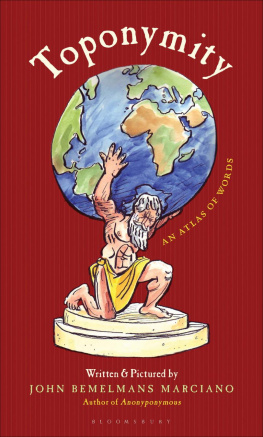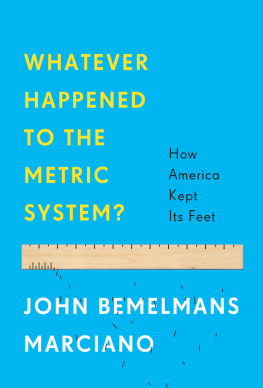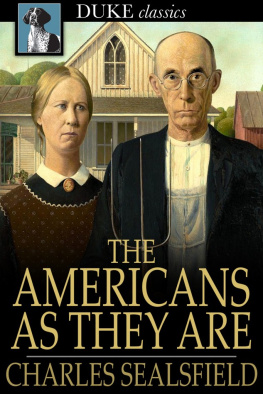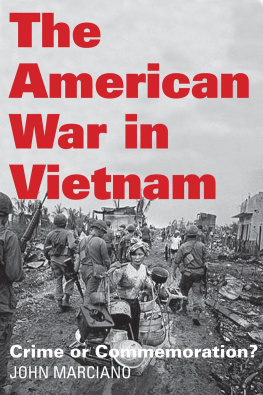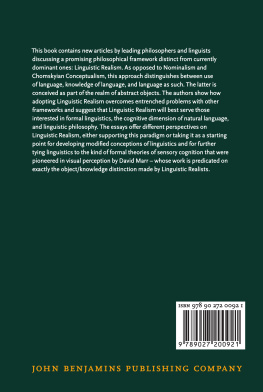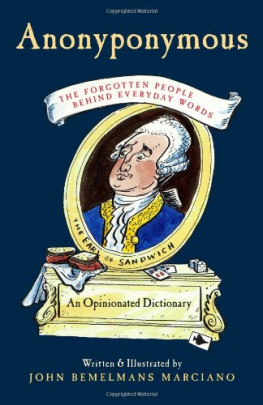toponymity
AN ATLAS OF WORDS
John Bemelmans Marciano
BLOOMSBURY
NEW YORK BERLIN LONDON SYDNEY
For Andromache
Table of Contents
Imagine you are an intrepid young Cro-Magnon who, like so many Cro-Magnons before you, has found a lovely spot in Europe in which to settle, only to find it occupied by a motley tribe of stocky, red-haired Neanderthals. Might making right, you kick them out, but as they are packing up their gear, you see them pointing over in the direction of a tall mountain and saying Schtroumpf (or thats what it sounds like anyway). So you and your people start calling it Mount Schtroumpf, and the river that flows from there the River Schtroumpf, and the berries growing on its slopes schtroumpfberries. In fact, the berries are so delicious that you sell them to the Cro-Magnons in the next valley over, who simply call them schtroumpfs, or rather strumbs, because they dont understand your language any better than you do theirs.
Future Cro-Magnon etymologists may consider the origin of strumb to be the name of a mountain, or they may even realize it is a Neanderthal word, but they wont get any further than that. Truth is, we can never get to the ultimate origin of any word. But is it not different for place names? Is there not something more elemental about them?
We tend to have this idea that names are not words they arent in dictionaries, right?but that isnt true. Names are words for specific things, while words are the names of something general. In English, we have the funny custom of capitalizing the former and lowercasing the latter, making a minor distinction seem great. The Morgue was the name of a building in Paris where they kept the dead; morgue is the word for that kind of building anywhere. Names and words operate under the same rules; they shift meaning from one thing to the next, from schtroumpf to Mount Schtroumpf to strumb, and what was once a word becomes a name and back again.
For a specific example, take Atlas, pictured on the cover of this book. If I ask you for a road atlas, does an image of him pop into your head? Or the title of a far-too-long Ayn Rand novel? Or the Atlantic Ocean? As a word, name, or title, all atlases come back to that Titan shouldering his burden. His name, in turn, is thought to come from a word that meant the bearer, but was he even the first to be called that? In ancient Greek cosmology, Mount Atlas itself was believed to hold up the sky (something obviously had to), so quite possibly the title of bearer went to the mountain, and the legend that was applied to itof a defeated gods punishmentcame later.
As for schtroumpf, it probably wasnt a Neanderthal toponym at all; more likely it was simply their word for mountain, or maybe what the mountain reminded them of (as Grand Teton is rumored to be French for Giant Ta-ta). Or, if the experience of American names adopted from native languages is to be our guide, it had absolutely nothing to do with that mountain at all.
(For what the word schtroumpf really means, by the way, see p. 121.)
A surprising thing happened on the way to making this book, which aimed to be part dictionary, part atlas, and part encyclopedia: It took on a narrative. A jumbled, hypertextual sort of narrative, to be surethe nature of an alphabetical list of entries ensures thatbut one with constantly intertwining characters and stories just the same.
The central theme of this book is exchange, its plot twist the advent of the Age of Exploration, when the trading of goods and ideas from different worlds began to take place across oceans rather than along seacoasts and riverbanks and through wastelands. Along the way, we have story after story that describes the experience of meeting the other. The English language helps us excavate this history, revealing its own perceptions plus the ones of all the languages from which it has adopted vocabulary. French, Spanish, Latin, Greek, Arabic: In the etymological fossil record of them all are the perceptions and prejudices of peoples who considered themselves Us and everyone else Them. Toponymous words provide a story of the best and worst of human interaction; some of them document our innate human curiosity about a world beyond our own, while others betray our xenophobia.
So how do place names become words? Most often, they are added to the name of a product. The idea of a faraway place where something grows or is made the best has a powerful pull; the added cost of getting it from there to here only adds to its mystique.
This is a phenomenon as old as the marketplace, or souk. In the Arabian Nights, there is a tale of a porter of Baghdad who is hired by a mysterious woman; the porter understands her to be wealthy from the Mosul cloak the lady wears, and from what she buys: Hebron peaches, Turkish quinces, Nile cucumbers, Egyptian limes, Aleppo jasmine, Damascus peaches, Aleppo raisins, Iraqi sugarcane, Baalbak figs, candles of Alexandria wax, and hard Syrian cheese. How far we are willing to go and at what cost we are willing to get something is a calculation we make every day, whether we shop at the corner store, Whole Foods, or Walmart.
Once a mark of quality is set, however, there is only one way to go: down. Thus, the good name of Italian Parmigiano cheese has become the horror of supermarket Parmesan. (How long has that shaker been sitting on the pizzeria counter, exactly?) At best, the ubiquity of a given product turns its name into something generici.e., cologne. At worst, it is used so aggressively that it falls victim to whats been called the euphemism treadmill or carousel: how coach went from being what only the nobility rode in to the most uncomfortable, degrading traveling compartment in the world.
Another common way for a name to become a word is by comparison. We use this all the time: Stop acting like abarbarian/a middle schooler/a baby. In this way, the name of a people enters the general lexicon. A gay woman is called a lesbian because of a famed Lesbian poet. As Lesbos is an island, lesbian is a toponym.
But what of the phrase to go dutchis that toponymous? The Dutch have two names for their country but are called after neither. Can you separate a place name from the people who live there? The answer is no.
The relationship of people and places over a given time period is at the very crux of toponymity. Names are ownership, and ownership is temporary; just ask the cheesemakers of Parma. Or the Greeks: The toponymy of Asia Minor has yielded more words than just about anywhere, and yet most of the old Hellenic place names have been scrubbed clean by the Turks, who brought names of their own. (Good luck trying to find Magnesia-on-the-Maeander on Google Maps.) Nor does it have only to do with one ethnicity replacing the other; within a given nation, a toponym can be an important political question. Burma or Myanmar?
To include words that come from peoples with names different from their homelands (or without homelands, as with the Gypsies) stretches the meaning of toponym. But this book aims to be as inclusive as possible. To that end, it lists words that come from the names of buildings, such as Pariss Morgue or the Mausoleum of Halicarnassus. There are physical phenomena, like winds that blow in certain seasons and not others, such as the monsoon. And then there are words that come from the names of self-selecting groups of peoplesassassins, buggersthat stretch the criteria to the limit but are included in the interests of good reading.
So in the end, what is toponymity? It, like most names, is not a word in dictionaries. Toponym, however, is. The Oxford English Dictionary defines it as a place-name; a name given to a person or thing marking its place of origin; the suffix -ity
Next page
